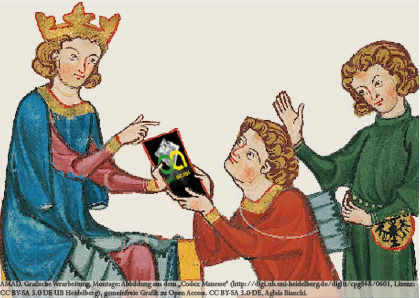AMAD
„Archivum Medii Aevi Digitale - Interdisziplinäres Open-Access-Fachrepositorium und Wissenschaftsblog für Mittelalterforschung‟Zur Einreichung

Langanzeige der Metadaten
| DC Element | Wert | Sprache |
|---|---|---|
| Autor*in | McShane, Kara L. | - |
| Autor*in | Hahn, Thomas | - |
| Datum | 2016 | - |
| Quelle | http://hdl.handle.net/1802/28498 | - |
| URI | https://www.amad.org/jspui/handle/123456789/68769 | - |
| Beschreibung | Thesis (Ph. D.)--University of Rochester. Dept. of English, 2014. ; In the Words of Others is part of a growing body of work that turns to medieval culture's multilingualism as a means of troubling the notion that English was the inevitable linguistic point at which England would arrive. I argue that, even as this inevitability now looks like the necessary outcome of the vernacular ambitions of Middle English authors, such an outcome was both refuted and reinforced by what I call "the exotic document." Ranging from royal letters to imagined alphabets and unreadable inscriptions, these documents are presented in Middle English texts as authoritative representations of non-English cultures, especially the vernacular of those cultures. And yet by their very presence in these Middle English writings, they highlight the uncertain position of English as the vernacular of medieval England. As a result, in these authors' works England and English are a locale and a language vulnerable to colonization as much as the exotic documents themselves are words medieval authors appropriate and translate from so many non-English "others." In the Words of Others thus cracks open how much the vernacular ambitions of those authors were not only a sign of the growing authority of English in this period, but were also riven by anxieties about what it meant for authors to find a voice of their own in English. These anxieties most often take shape in texts that would have been utterly familiar to medieval readers, but which are often left out of the medieval canon due to contemporary critical assumptions about the inevitability of the rise of English. The project thus begins in the unfamiliar, ultimately showing implications for the unduly familiar, Chaucer. In the Words of Others includes texts that move from geographical and chronological settings distant from England, such as romances of Alexander the Great and the famous travel narrative, The Book of John Mandeville, to texts set much closer to England, such as St. Erkenwald, where the exotic culture under consideration is England's own past. In the chapters on these texts, I argue that these documents paradoxically assert and undermine the vernacular's role in shaping cultural identity. While these first chapters demonstrate the variety of documents English texts construct, the last chapter of the project considers how these documents shape more traditionally canonical texts through a re-examination of Geoffrey Chaucer's The House of Fame. I argue that Chaucer's documents undermine the authority of writing as a form of memorialization through their translation of the classical, Latinate tradition that Chaucer himself inherits: the problem of authority in The House of Fame reflects the productive anxiety about writing's growing prevalence in fourteenth century English culture. | - |
| Format | Number of Pages:ix, 214 p. | - |
| Sprache | eng | - |
| Rechte | This item is protected by copyright, with all rights reserved. | - |
| Schlagwörter | Medieval romance | - |
| Schlagwörter | Documentary culture | - |
| Schlagwörter | Alliterative poetry | - |
| Schlagwörter | Medieval literature | - |
| Dewey-Dezimalklassifikation | 940 | - |
| Titel | In the words of others : exotic documents and vernacular anxieties in medieval England. | - |
| Typ | Thesis | - |
| AMAD ID | 579001 | - |
| Jahr | 2016 | - |
| Open Access | 2 | - |
| Enthalten in den Sammlungen: | BASE (Bielefeld Academic Search Engine) General history of Europe | |
Dateien zu dieser Ressource:
Es gibt keine Dateien zu dieser Ressource.
Alle Ressourcen in diesem Repository sind urheberrechtlich geschützt, soweit nicht anderweitig angezeigt.

